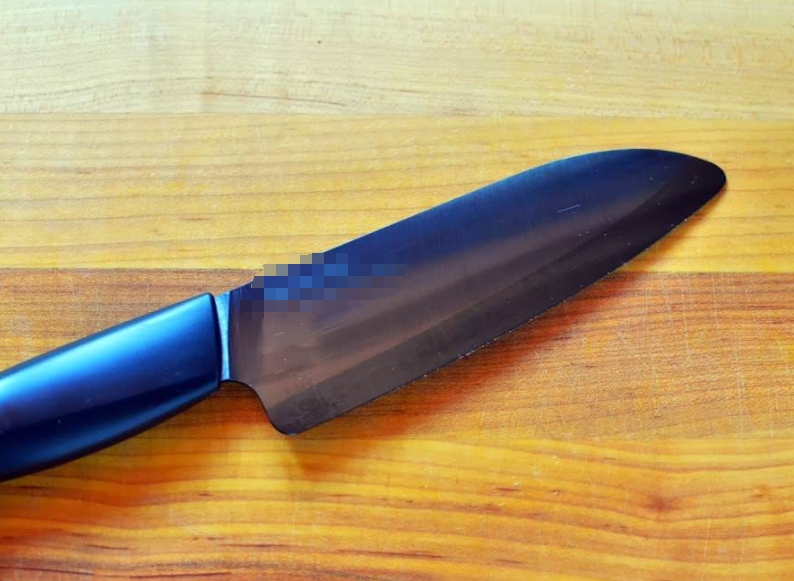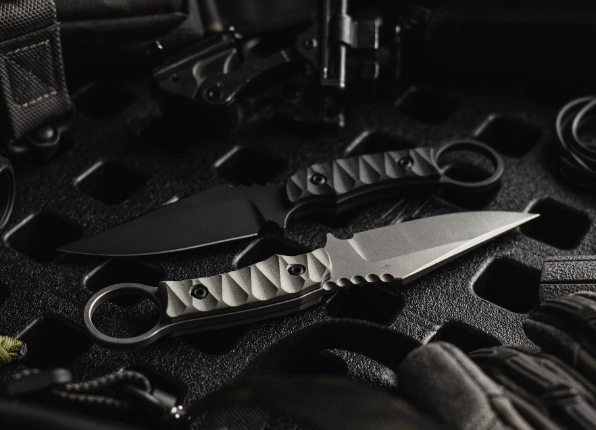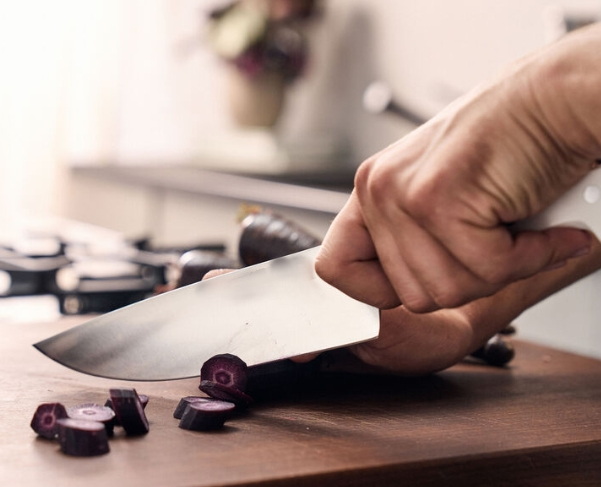

Views: 222 Author: Ella Publish Time: 2025-04-27 Origin: Site








Content Menu
● Understanding the Terms: Chef Knife vs. Kitchen Knife
● Key Differences Between a Chef Knife and a Kitchen Knife
● Types of Chef Knives and Their Characteristics
>> Japanese Chef Knives (Gyuto)
● Detailed Comparison: Chef Knife vs. Santoku Knife
● How to Choose the Right Chef Knife
● Essential Knife Skills for Chef Knives
● Maintenance Tips for Chef and Kitchen Knives
● Frequently Asked Questions (FAQ)
>> 1. What is the main difference between a chef knife and a kitchen knife?
>> 2. How do chef knives differ from santoku knives?
>> 3. What size chef knife is best for home cooks?
>> 4. Should I choose a heavier or lighter chef knife?
>> 5. How do I maintain the sharpness of my chef knife?
When it comes to kitchen tools, knives are arguably the most essential. Yet, many people often confuse terms like "chef knife" and "kitchen knife," assuming they are interchangeable. In reality, these terms refer to different concepts, and understanding the distinction can greatly enhance your cooking experience. This comprehensive article explores the differences between a chef knife and a kitchen knife, their types, uses, and how to choose the right one for your culinary needs.

A kitchen knife is a broad term that encompasses all knives used in the kitchen for food preparation. This includes a variety of knives such as chef knives, paring knives, bread knives, utility knives, boning knives, and more. Each type of kitchen knife is designed for specific tasks, ranging from slicing bread to filleting fish.
A chef knife is a specific type of kitchen knife. It is often considered the most versatile and essential knife in any kitchen. Typically, a chef knife features a broad, sharp blade that ranges from 6 to 14 inches in length, with a curved edge that facilitates a rocking motion for chopping and slicing[1][3][15].
| Feature | Chef Knife | Kitchen Knife (General) |
|---|---|---|
| Definition | A specific, versatile knife used for many tasks | Any knife used in the kitchen |
| Blade Length | Usually 6 to 14 inches | Varies widely depending on knife type |
| Blade Shape | Broad, curved edge with a pointed tip | Varies: straight, serrated, narrow, or broad blades |
| Primary Uses | Chopping, slicing, dicing vegetables, meat, herbs | Depends on the knife type (e.g., bread knife for bread, paring knife for peeling) |
| Cutting Techniques | Rocking motion | Varies (rocking, slicing, push cut, sawing) |
| Versatility | Highly versatile, multi-purpose | Specialized or multi-purpose depending on type |
Western chef knives, often German or French style, typically have a curved blade that allows for a rocking chopping motion. They tend to be heavier and thicker, making them ideal for chopping hard vegetables and meats[15][17].
Gyuto is the Japanese equivalent of a chef knife. It has a thinner, lighter blade made from harder steel, usually with a straighter edge than Western chef knives. This design allows for precise slicing and is favored for cutting fish and delicate meats[6][17].
Santoku, meaning "three virtues," is a Japanese multi-purpose knife used for slicing meat, fish, and vegetables. Unlike the curved blade of a chef knife, the santoku has a straighter edge and a rounded tip, favoring a chopping or push-cutting technique rather than rocking[2][8].
| Feature | Chef Knife | Santoku Knife |
|---|---|---|
| Blade Shape | Curved edge with pointed tip | Straight edge with rounded tip |
| Cutting Technique | Rocking motion | Push cut, up-and-down slicing |
| Blade Length | 6-14 inches | 6.5-7 inches (16-20 cm) |
| Origin | Western (European) | Japanese |
| Best For | Versatile: meat, vegetables, herbs | Multi-purpose: meat, fish, vegetables |
| Weight | Heavier | Lighter |
Both knives can perform similar tasks, and the choice between them often comes down to personal preference and cutting style[2][8].

To better understand the chef knife's place in the kitchen, here are some other common kitchen knives:
- Paring Knife: Small blade (2-4 inches), used for peeling, trimming, and detailed work[3][17].
- Bread Knife: Serrated blade designed for slicing bread without crushing it[9].
- Utility Knife: Medium-sized knife for general tasks that are too small for a chef knife but too large for a paring knife[17].
- Boning Knife: Thin, flexible blade designed for deboning meat and fish[1].
- Cleaver: Heavy, broad blade for chopping through bones[1].
Most chefs prefer an 8-inch blade for versatility and control, but blades can range from 6 to 14 inches depending on your needs. Curved blades are better for rocking cuts, while straighter blades suit slicing[14][15].
Chef knives are commonly made from stainless steel, carbon steel, or high-carbon stainless steel. Japanese knives tend to be harder and sharper but require more maintenance. Western knives are thicker and more durable[16][17].
A heavier knife offers momentum for chopping tough ingredients, while a lighter knife allows for more precise slicing. Balance between handle and blade is crucial for comfort and safety[14][18].
Handles come in various materials such as wood, plastic, or composite. The grip should feel secure and comfortable, fitting your hand size and cutting style[14][15].
Mastering knife skills enhances safety and efficiency in the kitchen. Techniques include:
- Rocking Chop: Using the curved blade to rock back and forth while chopping herbs or vegetables[2][7].
- Push Cut: A straight slicing motion favored with santoku knives[2].
- Mincing: Fine chopping for garlic, herbs, or onions[5].
- Julienne and Dice: Precision cuts for vegetables[5].
- Sharpen Regularly: Use a whetstone or professional sharpening service for best results.
- Hone Often: A honing rod realigns the blade edge between sharpenings.
- Clean Properly: Hand wash and dry immediately to prevent rust and damage.
- Store Safely: Use knife blocks or magnetic strips to protect blades and prevent accidents[14][18].
While the term kitchen knife refers broadly to any knife used in food preparation, a chef knife is a specific, versatile type of kitchen knife designed for a wide range of tasks such as chopping, slicing, and dicing. Chef knives typically feature a broad, curved blade that facilitates a rocking motion, making them indispensable in both professional and home kitchens. Other knives like the santoku offer alternative blade shapes and cutting techniques, catering to different preferences and cuisines.
Choosing the right chef knife depends on your cooking style, preferred cutting techniques, blade material, weight, and comfort. Proper maintenance and mastering essential knife skills will ensure your knives perform well and last a lifetime.

A chef knife is a specific type of kitchen knife designed for versatility in chopping, slicing, and dicing, while a kitchen knife is a general term for any knife used in the kitchen[1][10].
Chef knives have a curved blade and pointed tip suitable for rocking cuts, whereas santoku knives have a straighter edge and rounded tip, favoring push cuts[2][8].
An 8-inch blade is generally ideal for most home cooks, offering a balance of control and versatility[14][15].
It depends on your preference and cooking style; heavier knives provide momentum for chopping, while lighter knives allow for more precise slicing[14][18].
Regular honing, periodic sharpening with a whetstone or professional service, and proper cleaning and storage are key to maintaining sharpness[14][18].
[1] https://kamikoto.com/blogs/fundamentals/understanding-kitchen-knives-types
[2] https://www.knivesandtools.co.uk/en/ct/chefs-knife-versus-santoku.htm
[3] https://www.blackmoorhome.co.uk/blog/a-guide-to-different-types-of-kitchen-knives/
[4] https://www.istockphoto.com/photos/kitchen-knife
[5] https://www.youtube.com/watch?v=YrHpeEwk_-U
[6] https://sharpedgeshop.com/blogs/knives-101/types-of-japanese-kitchen-knives
[7] https://www.youtube.com/watch?v=NlnOsnr94qM
[8] https://www.souschef.co.uk/blogs/the-bureau-of-taste/the-complete-guide-to-kitchen-knives
[9] https://madeincookware.com/blogs/types-of-kitchen-knives
[10] https://tradingpieces.co.nz/differences-a-chefs-knife-and-a-cooks-knife/
[11] https://www.procook.co.uk/page/what-are-the-different-types-of-kitchen-knives
[12] https://www.istockphoto.com/illustrations/chef-knife
[13] https://www.youtube.com/watch?v=gC4uUgSLdxI
[14] https://www.souschef.co.uk/blogs/the-bureau-of-taste/buyer-s-guide-to-chef-s-knives
[15] https://www.kitchenknives.co.uk/know-how/blog/different-types-of-kitchen-knife/
[16] https://sharpedgeshop.com/blogs/knives-101/how-to-choose-a-kitchen-knife
[17] https://www.escoffier.edu/blog/culinary-arts/different-knives-and-the-best-uses-for-each/
[18] https://www.chefs-edge.co.uk/blogs/knife-information/guide-to-buying-a-chef-s-knife
[19] https://www.seriouseats.com/the-best-essential-knives
[20] https://www.jessicagavin.com/types-of-kitchen-knives/
[21] /what-s-the-difference-between-a-chef-s-knife-and-a-kitchen-knife.html
[22] https://www.youtube.com/watch?v=LO35cdWL1MQ
[23] https://www.everythingkitchens.com/knife-education-guide.html
[24] https://www.telegraph.co.uk/recommended/home/kitchen/best-chefs-knives/
[25] https://www.seriouseats.com/western-versus-japanese-style-chefs-knives-6751328
[26] https://www.youtube.com/watch?v=QgVyN6Lpiuc
[27] https://www.nisbets.com.au/yourcompleteguidetokitchenknives
[28] https://stock.adobe.com/search?k=chef+knife
[29] https://www.procook.co.uk/shop/knives-scissors/chefs-knives
[30] https://madeincookware.com/blogs/types-of-kitchen-knives
[31] https://www.youtube.com/watch?v=-al-bs737fw
[32] https://www.freepik.com/free-photos-vectors/kitchen-knife
[33] https://www.kitchenknives.co.uk/know-how/blog/different-types-of-kitchen-knife/
[34] https://www.youtube.com/watch?v=G-Fg7l7G1zw
[35] https://www.shutterstock.com/search/kitchen-knife
[36] https://www.youtube.com/watch?v=GmmOJuHOoYs
[37] https://thesharpchef.co.uk/pages/knife-types
[38] https://www.youtube.com/watch?v=VJNA4vrdWec
[39] https://elementknife.com/pages/common-questions-about-kitchen-knives
[40] https://www.thebambooguy.com/blogs/kitchen-knives/frequently-asked-questions-about-kitchen-knives
[41] https://artisanrevere.com/blogs/education/knife-faq-and-problem-solving
[42] /kitchen-knife-vs-chef-knife-what-s-the-real-difference.html
[43] https://www.chefkoj.com/blog/knives
[44] https://www.knivesandtools.co.uk/en/ct/information-about-kitchen-knives.htm
[45] https://www.procook.co.uk/page/what-are-the-different-types-of-kitchen-knives
[46] https://www.reddit.com/r/cookingforbeginners/comments/za2wx4/is_it_always_best_to_use_a_chefs_knife/
[47] https://www.knivesandtools.co.uk/en/ct/buying-guide-what-do-you-want-to-cut-kitchen-knives.htm
[48] https://www.knivesandtools.co.uk/en/ct/which-kitchen-knife-do-i-need.htm
[49] https://gatefootforge.co.uk/product/6-chefs-knife/
[50] https://www.gettyimages.co.uk/photos/kitchen-knife